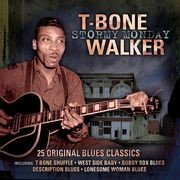- Call It Stormy Monday (But Tuesday Is Just as Bad)
Infobox Standard
title = Call It Stormy Monday (But Tuesday Is Just As Bad)

image_size = 180px
caption = Cover to a T-Bone Walker album containing the song
writer =T-Bone Walker
composer = T-Bone Walker
lyricist =
published = 1947
language = English
original_artist = T-Bone Walker (1947)
recorded_by =Allman Brothers Band (1971),Albert King (1979), Jethro Tull (1988),Eva Cassidy (1997), Cream (2005), And many others..."Call It Stormy Monday (But Tuesday Is Just As Bad)", also known as "Call It Stormy Monday", or just "Stormy Monday", is a
blues song written byT-Bone Walker and first recorded in 1947. Confusingly, it is also sometimes referred to as "Stormy Monday Blues", although that is actually the title of a different song, a #1 R&B hit recorded in 1942 byEarl Hines andBilly Eckstine ; Walker titled his song as he did to avoid the name collision.The original recording appeared on
Black & White Records , produced byRalph Bass , and was one of Walker's breakthrough sides in pioneering the idiom of electric blues guitar. This recording also featured smokytrumpet work from sidemanTeddy Buckner . It reached #5 on the R&B charts in 1948.B.B. King has said that "Call It Stormy Monday" inspired him to begin playing electric guitar.Walker re-recorded the song with better fidelity and a somewhat different arrangement on his classic 1959
Atlantic Records album "T-Bone Blues".The song became a standard for blues and
blues rock artists, and over the years was recorded byAlbert King ,Eva Cassidy ,Question Mark and the Mysterians , Jethro Tull, and others. Trouble ensued when artists named it "Stormy Monday Blues", however, as for instanceBobby Bland did on a well-known rendition, as it was mis-credited and royalties went to the Hines-Eckstine song rather than Walker's. This may have also happened on some of the treatments that were just called "Stormy Monday".The song was most popularized by
The Allman Brothers Band , who included a sterling live performance (as "Stormy Monday") on their classic album "At Fillmore East " in 1971. It garnered considerable airplay on progressive rock andalbum-oriented rock radio formats during the 1970s.The 1988
Mike Figgis film "Stormy Monday " was named for the song, and includesB. B. King 's performance of it over the opening credits.tructure
"Stormy Monday", in the key of
G major , follows the structure of an altered12-bar blues , using the following chord progression::G9 | C9 | G9/A♭9 | G9 | C9 | C9 | G9 / A minor7 | B minor7 / B♭ minor7 | A minor7 | C minor7 | G9 / C9 | G9 / Daugmented The Allman Brothers instrumentation of the song is typical of the group, consisting ofvocals , two guitars,bass guitar , organ, and drums. It demonstrates a different style of music, however, from most Allman Brothers pieces, with a very slow tempo and softer feel, running at only 60 beats per minute. Duane Allman's virtuosic guitar playing can be heard at this slower tempo, in the first of three solos, Gregg Allman's organ solo shifted to a jazz-waltz feel, Dickey Betts' guitar solo ending it, and with a careful tape edit a harmonica solo by Thom "Ace" Doucette omitted from the issued version.
Wikimedia Foundation. 2010.
